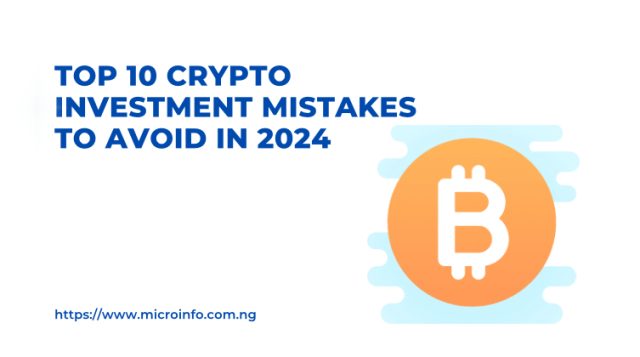Individual and institutional investors are increasingly interested in cryptocurrency investments owing to its potential for long-term growth and protection against economic issues such as inflation. The success of digital assets has made trading one of the best ways to generate money online. However, the paradox surrounding digital assets stems from their volatility as hazardous, profitable assets that cannot be predicted perfectly. You can succeed in cryptocurrency investing if you avoid the worst mistakes.
Table of Contents
1. Lack of research.
One of the most typical crypto investment blunders is making an investment without first conducting a comprehensive investigation. As a result, Fear of Missing Out (FOMO) frequently drives investors to make rash judgements without a thorough understanding of the fundamentals of a cryptocurrency project. For example, when a new cryptocurrency project appears, it is critical to look for a white paper outlining its goals and objectives, as well as seek reviews from credible sources. Scammers are using bogus meme coins to steal funds from naive investors. As a result, Do Your Own Research (DYOR) will provide you with information about the reputation and feasibility of the crypto asset in which you wish to invest.
2. Assuming All Crypto Is Bitcoin All cryptocurrencies are not Bitcoin.
In other words, Bitcoin is just one of many tens of thousands of assets in the cryptocurrency market. Bitcoin has become the face of the cryptocurrency market due to its widespread media coverage and high value as the most costly crypto asset. But it isn’t the only cryptocurrency. Other coins, known as “altcoins,” such as Litecoin, have their own value and features. Stablecoins are another type of crypto asset that has its value tethered to commodities such as the US dollar in a 1:1 ratio to maintain stability. Stablecoins include USDT and USDC. There are other meme coins, such as Dogecoin, that have real-time value. As a result, in order to make an informed decision on which crypto asset to invest in, you must first gain a thorough grasp of it.
3. Investing in One Coin.
Tens of thousands of crypto assets exist on the market, and investing in a single coin may be risky. You may need to invest in numerous crypto assets, just like the financial market does when diversifying portfolio investments in stocks and bonds. You can invest in popular cryptocurrencies such as Bitcoin, Ethereum, Dogecoin, Litecoin, Binance Coin, USDT, and Tron, among others. A diverse cryptocurrency portfolio provides leverage when one of the assets experiences a bearish run, preventing you from losing all of your capital. This is compatible with the proverb, “Don’t put all your eggs in one basket.”
4. Forgetting the CryptoWallet Password.
One important feature of bitcoin is security, which is largely dependent on you. Because of the unbreakable alphanumeric key mechanism it employs, investors who choose to buy a crypto asset directly and keep it in a wallet nearly never have the wallet stolen. If you lose the wallet key, you can’t access your funds. It’s horrible to invest in cryptocurrency and then lose the key to your wallet. As a result, it is critical that you keep your crypto wallet password safe and secure so that you can always access it.
5. Making Mistakes While Trading.
Simple mistakes are typical among new traders, and they frequently entail typos, such as transferring crypto assets to the wrong address or selling for the incorrect amount. This can occur when cryptocurrency users attempt to transmit or receive funds across wallets using alphanumeric addresses. Missing a single digit or alphabet can result in cash being sent to the wrong wallet. Meanwhile, tracing and recovering cryptocurrency is not fully functional, which means you may not be able to recover your assets if you make certain mistakes while trading. As a result, you must constantly be patient and double-check when sending funds to cryptocurrency wallets.
6. Falling into cryptocurrency scams.
The cryptocurrency industry has become a hotbed for scammers who employ various methods or schemes to steal from unsuspecting customers. Crypto scams are on the rise, with criminals using phishing, romance scams, pig slaughtering, deepfakes, and other dubious tactics to target cryptocurrency consumers. To protect the security of your wallets and cash, you must stay up to date on the latest developments and trends in the cryptocurrency market.
7. Ignoring regulatory compliance.
The growing popularity of cryptocurrencies has caused governments to enact legislation governing asset activity, particularly Bitcoin trading and mining. Some governments, for example, have banned cryptocurrency trading operations, whereas others and areas intend to implement crypto legislation to guide users. Notable among these is the European Union’s Markets in Crypto-Assets Regulation (MiCA), which is planned to take effect in 2025. As a result, being up to date on the crypto regulatory landscape in your country is critical to ensuring that your cryptocurrency trading is legal. Notably, there is still discussion in the United States about whether bitcoin should be classified as “securities” overseen by the Securities and Exchange Commission (SEC) or as “commodities” under the power of the Commodities Futures Trading Commission (CFTC). There are extra trade and mining regulations in various states in the United States and other nations.
8. Ignoring crypto fees and taxes.
Investing in cryptocurrency is not free in nations such as Australia, the United States, and Canada. To avoid consequences, you must comply with an Australian crypto tax and a Canadian crypto tax framework. This also applies to the United States. Every cryptocurrency exchange charges a predetermined fee. Fees may include transaction fees, gas expenses, and blockchain fees. However, the rates vary depending on when you use the network. As a result, you must conduct a study to determine the fees you can expect if you invest in cryptocurrency.
9. Not Selecting the Right Crypto Exchange Platform.
A cryptocurrency exchange is a site where you may purchase and sell your assets. This might be your gateway to the cryptocurrency market. However, rushing to trade on any platform can lose you money if you do not conduct proper research before selecting the best crypto exchange. The cryptocurrency market is flooded with trading platforms, and you should be aware that not all of them are legitimate. As a result, you must spend your time researching and selecting the exchange that best suits your needs. You may need to examine trading fees, cryptocurrency choices, platform validity and security, educational content, and so on to make an informed conclusion. Regarding preference, Prestmit is the finest platform to sell Bitcoin and other crypto assets. We offer cutting-edge technologies like a Bitcoin rate calculator, sophisticated security, and an easy-to-use platform interface to help you trade profitably, safely, and seamlessly.
10. Lack of knowledge about when to exit and reap profits.
Crypto assets like Bitcoin and Ethereum are volatile, which might lead to a bullish run, raising the value of your holdings. This may be the perfect time to sell your asset for a profit because what happens next is unpredictable. If you are holding your coin for a short period of time, you should always have an exit strategy in place, while long-term holders may not. Your cryptocurrency investment goals should include how much you want to make and when you want to stop losing money.
Conclusion
The value of some cryptocurrencies is rising, making cryptocurrency investment popular worldwide. However, you need to be aware of several frequent pitfalls to avoid in this undertaking. While we have highlighted some of the faults in this post, further research is needed to prepare for the challenges that crypto investment may present.




